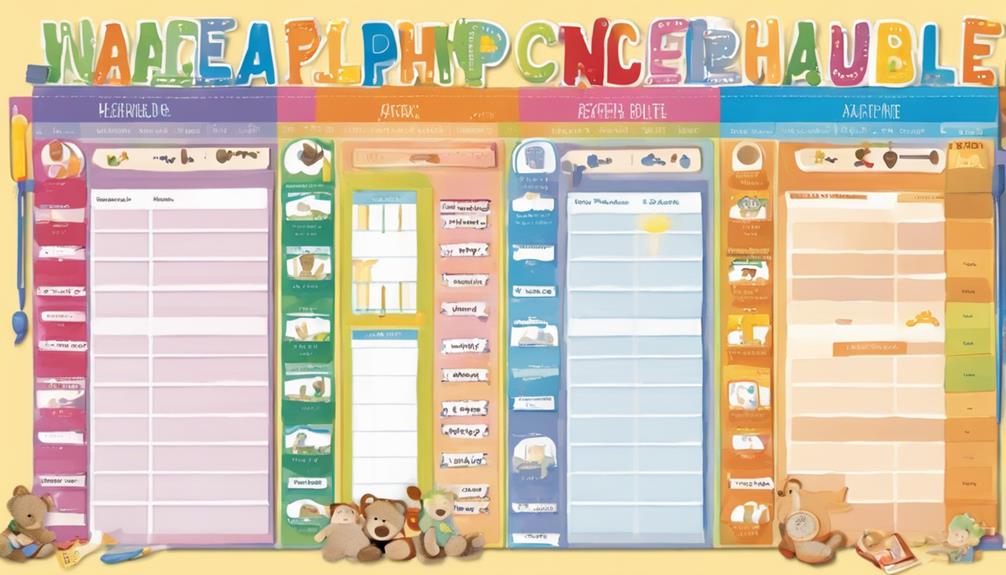As we begin the journey of establishing a strong 6-week-old formula feeding schedule for our infants, the specifics of timing and quantity are essential for nurturing their growth and development.
While the initial phase may seem challenging, understanding the nuances of feeding cues and growth patterns can pave the way for a harmonious routine.
The upcoming discussion will shed light on key strategies to navigate this important aspect of parenting, ensuring a smooth shift into this new chapter of caring for our infants.
Key Takeaways
- Establish a consistent feeding routine to regulate hunger cues and promote better sleep patterns.
- Monitor baby's weight gain and adjust formula amounts to meet individual needs.
- Maintain a structured feeding schedule with 8-12 feedings every 2-3 hours for optimal growth.
- Create a peaceful nighttime environment for feeds, gradually reducing night feed durations for longer sleep periods.
Importance of Establishing a Routine
Establishing a routine for feeding your 6-week-old baby is essential for their well-being and your peace of mind. Consistency in feeding times can regulate hunger cues, promote better sleep patterns, and help track your baby's growth to make certain they receive adequate nutrition.
By planning feeding times, caregivers can organize their day more effectively and coordinate care seamlessly. This structured approach not only benefits the baby but also instills confidence and a sense of control in parents and caregivers alike.
Knowing when to expect feedings creates a sense of security for the baby, aiding in their overall comfort and development. As we navigate the early stages of parenthood, setting a routine offers a reliable framework that fosters a nurturing environment for both the baby and the caregivers.
Embracing this practice can lead to smoother changes and a deeper bond with your little one.
Recommended Feeding Frequency

Understanding the feeding needs of a 6-week-old formula-fed baby involves comprehending that they typically require feeding every 2 to 3 hours at this stage. New parents need to be aware that babies of this age may consume around 4 to 5 ounces of formula per feeding. Establishing a consistent feeding schedule is key, aiming for 8 to 12 feedings within a 24-hour period. By following a routine, both the baby and parents can benefit from predictability and structure. Paying attention to hunger cues and adjusting the feeding schedule based on the baby's individual requirements is vital.
| Feeding Frequency | Amount per Feeding |
|---|---|
| Every 2-3 hours | 4-5 ounces |
This table provides a visual representation of the recommended feeding frequency and the average amount a 6-week-old formula-fed baby may consume. Remember, every baby is unique, so being attuned to your little one's signals and needs is key in creating a successful formula feeding schedule.
Tips for Ensuring Baby's Nutrition
To guarantee high-quality nutrition for your 6-week-old formula-fed baby, pay close attention to their hunger cues and avoid overfeeding. Here are some essential tips to make sure your baby is getting the nutrition they need:
- Follow Recommended Feeding Amounts: A 6-week-old baby typically consumes 2 to 4 ounces of formula per feeding every 2 to 3 hours. Following these guidelines set by the American Academy of Pediatrics helps meet your baby's nutritional requirements.
- Monitor Baby's Well-being: Keep an eye on your baby's weight gain, wet diapers, and overall health. These indicators can help you assess if your feeding schedule is supporting your baby's growth and development.
- Establish a Routine: Consistency in feeding times and amounts can help create a feeding schedule that benefits your baby's health in their first year. By knowing your baby's cues and sticking to a structured Baby Feeding Schedule, you can ensure they're receiving adequate nutrition for the best growth and well-being.
Handling Nighttime Feedings

During nighttime feedings for your 6-week-old baby, maintaining a consistent routine can help promote longer stretches of sleep. At this age, night feeds may happen every 3-4 hours to support your baby's growth and development.
Consider offering a dream feed before you go to bed to stretch out the time between nighttime feedings. A consistent bedtime routine, such as dimming the lights and keeping the room quiet, can signal to your baby that it's time for sleep after nighttime feeds.
By creating a dark and peaceful environment during these nighttime feeds, you can help your baby differentiate between nighttime and daytime feeds. Additionally, gradually reducing the duration of nighttime feeds can encourage your little one to sleep for longer periods without needing to feed frequently.
These strategies not only support your baby's sleep but also aid in their overall growth and development.
Adjusting the Schedule as Baby Grows
As your baby continues to grow at 6 weeks old, adjustments to their formula feeding schedule may be necessary to guarantee they're receiving adequate nutrition. Here are some important points to take into account:
- Increasing Nutritional Needs: Your 6-week-old baby may require more formula to support their growing body and development. Pay attention to their cues and take into consideration offering a bit more formula per feeding if needed.
- Signs of Fullness: Watch for signs that your baby is full to prevent overfeeding. These signs may include turning away from the bottle, slowing down their sucking, or becoming disinterested in feeding.
- Consulting the Pediatrician: It's crucial to consult with your pediatrician when adjusting the formula feeding schedule. They can provide personalized guidance based on your baby's hunger levels, efficient feeding patterns, and overall development.
Frequently Asked Questions
How Much Formula Should a 6 Week Old Eat?
We usually give our 6-week-old baby about 4 to 5 ounces of formula per feeding. They eat every 3 to 4 hours, totaling 6 to 8 feedings a day. Pay attention to hunger cues and consult your pediatrician for personalized advice.
How Long Should a 6 Week Old Be Between Feedings?
We aim to address the needs of 6-week-old babies by understanding they can go 2-3 hours between feedings during the day and stretch 4-6 hours at night. It's important to follow their hunger cues for a balanced feeding schedule.
What Is the Feeding Pattern for a 6 Week Old Baby?
At 6 weeks, babies typically feed every 3-4 hours, consuming 4-5 ounces per feeding. Signs of hunger may include rooting or fussiness. Babies may have 5-6 feedings daily, with more predictable cues emerging.
What Is the Daily Schedule for a 6 Week Old Baby?
I comprehend the daily schedule for a 6-week-old baby can feel overwhelming. It involves around 6-8 feedings every 3-4 hours, with possible longer sleep stretches at night and 1-2 nighttime feedings. Watching for hunger cues helps establish a healthy routine.
Conclusion
To sum up, establishing a solid feeding routine for your 6-week-old baby is key to their growth and development.
Remember, Rome wasn't built in a day, so be patient with yourself and your little one as you navigate this new journey.
Trust your instincts, follow the recommended guidelines, and don't forget to enjoy these precious moments with your baby.
Happy feeding!









